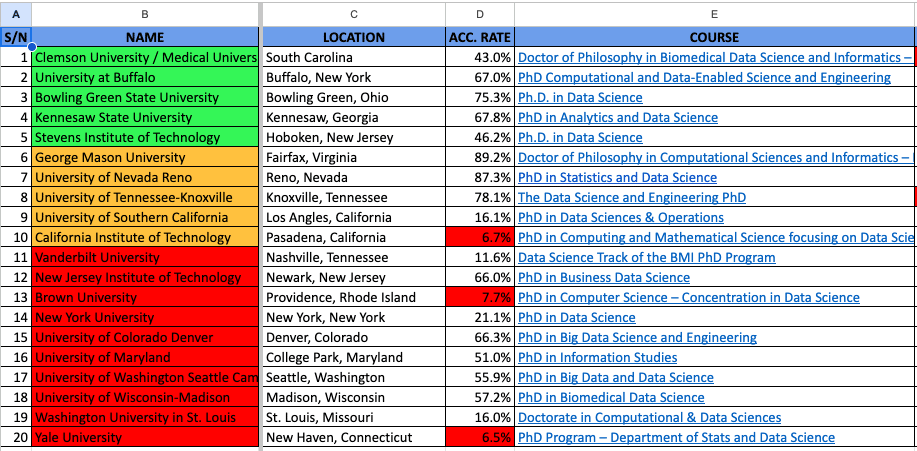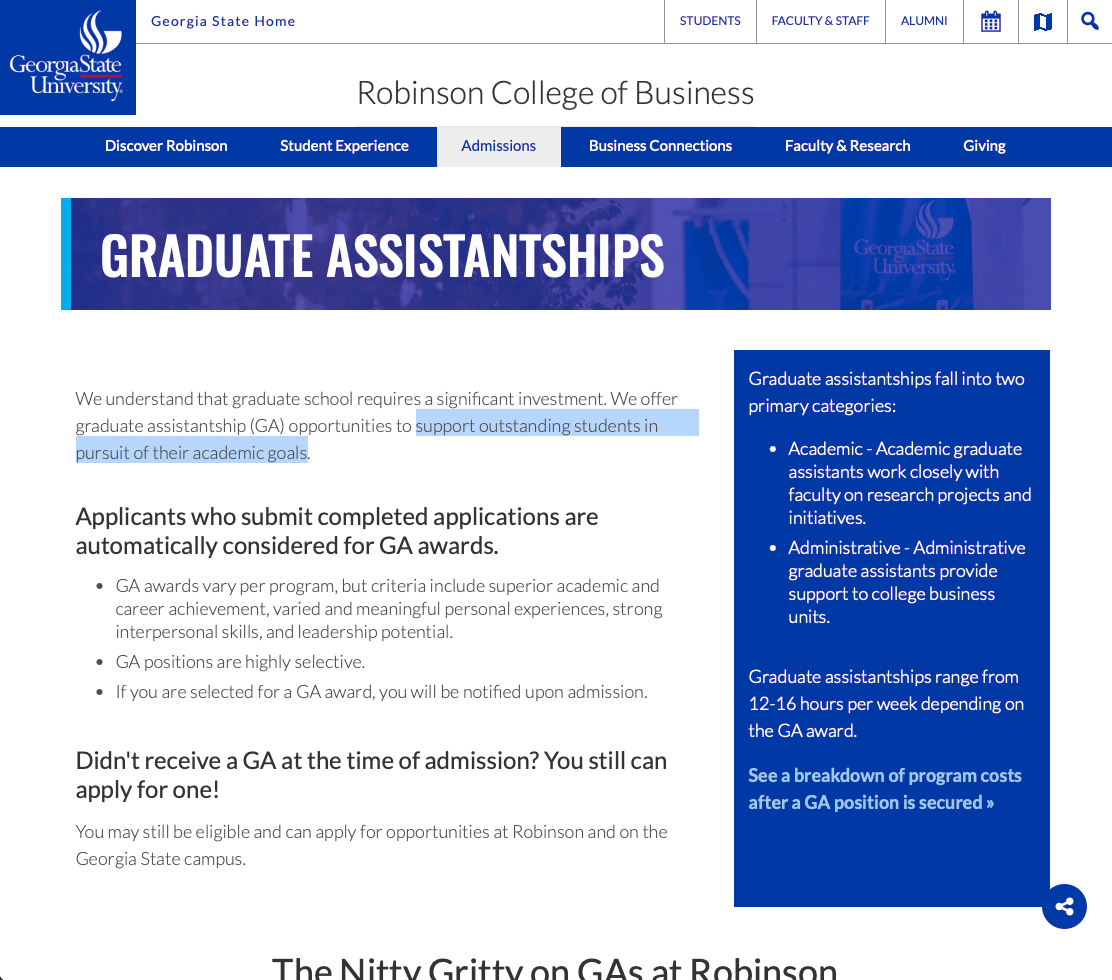Hard truths I wish I knew before studying in the US (scholarships)
Part 1: Scholarships

An announcement before we start.
The first Scholarship Accelerator Bootcamp starts this Saturday (April 5th).
This 6-week bootcamp is designed to help you secure fully funded scholarships (Graduate Assistantships) by submitting 5 high-quality applications for Spring 2026.
Enrollment ends on April 5th!
I have been studying in the US for 4 years now, and it's been a great experience.
I've been thinking about the top advice I'll give my younger 2016 self, who was so ambitious to study in the US.
The advice will help him get the best US opportunities without making a lot of mistakes.
When I started writing them, I wrote out 50 nuggets of wisdom.
So, I have divided them into 5 parts (which we will handle over the next 5 weeks):
Scholarship
Visa
Mindset
Money
Lifestyle
Today, let's talk about scholarships:
1: PhDs receive more funding than Master's programs
Most PhD programs are fully funded.
Many master's degrees don't offer scholarships. However, some students who apply strategically can get a full tuition waiver.
What's the difference?
Fully funded means you don't need a bank statement in your visa interview. The scholarship covers your tuition and living expenses.
A full tuition waiver covers only tuition. At your visa interview, you still need to show a bank statement for your living expenses.
If you only have a bachelor's degree, and you plan to do a PhD at some point, you can apply for it now.
2: Everyone does not have to write tests before getting scholarships
I was so ambitious in 2017 when I wanted to come to the US.
I wrote the TOEFL in March in Enugu, Nigeria.
I wrote the GRE General in May in Port Harcourt, Nigeria.
I wrote the GRE Maths in October in Benin, Nigeria.
That was my first and only time in Benin. We were only 2 in the hall writing that day. I was writing GRE Maths, and the other guy was writing GRE Physics.
My philosophy about studying abroad was I had to write all the tests to be competitive.
Which helps, but it's not necessary for everyone.
Other scholarship recipients in the same master's program as I just came in with high GPAs and work experience.
I've met students who got a direct PhD without writing tests.
Then I concluded that competition depends on where you apply, which leads us to the next point.
3: Apply to schools that match your application strength
One problem international applicants have is finding the right schools to apply to.
This is understandable since there are over 4000 universities and colleges in the US.
When you apply, some schools will fall in love with your profile.
Others will not.
My PhD application was denied admission at the University of Buffalo. However, I received fully funded offers from KSU and Clemson University.
One way is to check the school's acceptance rate online before applying.
Then, apply to many safety schools (above 70% acceptance rate)
If your profile is great, you can have the big schools in your mix.
Ivy League students experience an easier visa interview process.
4: Reach out to the program coordinators before applying
When I was applying for my PhD, I reached out to the program coordinators of the 10 major schools I was considering.
I shortlisted 20, but my eyes were really on 10 of them (the top 10).
Based on their responses, I applied to 5 schools (the ones in green).
I submitted my application for KSU on the deadline (February 1). My evaluated transcript got to them a week later (which is late).
I talked with the program coordinator, and she said they would start looking at my profile while waiting for the evaluated transcript.
5: Don’t do your undergrad study in the USA except on a full-ride
The US has a few undergraduate scholarships, but they are highly competitive.
My complete undergraduate degree in UNN cost me less than $500.
The average cost of a US undergraduate degree is $38,270. That's $153,080 for 4 years.
The University of Michigan requires you to have:
A CGPA of 4.0/4.0 in secondary school.
An SAT combined score of at least 1020.
An IELTS score of 6.5 or TOEFL score of (IBT: 80, CBT: 213, PBT: 550).
Do you have that profile?
My recommended strategy:
Do your undergrad in your country, then come for your fully funded PhD scholarship.
6: You can get scholarships with a 2:2 degree
When applying for scholarships in 2017/2018, my mindset was faulty.
I thought scholarships were only for first-class or 2:1 degrees at least.
I have been constantly shocked to meet several international students who came here with a 2:2.
They submitted a strong application, however. They did not just submit their 2:2 like that and hope for the best. Some of them had to take the GRE.
One hack I found is that transcript evaluations increase your CGPA. I don't know how it works, but I've seen it work for many students.
You can do this free conversion to see for yourself if you have your transcript.
Head over to https://applications.wes.org/igpa-calculator/
Create a new account
Input all your grades from the first year to the final year.
It'll give you a new score on a 4.0 scale.
You can't use this to apply, but you can attach the screenshots as you reach out to the program coordinators.
7: Fall has more funding than Spring
The US academic calendar begins in the Fall semester. The calendar runs from August to July.
The fall semester runs from August to December.
The spring semester runs from January to May.
For every academic year, the department has a new budget.
This is why the Fall semester has more funding than the Spring.
My first scholarship from ETSU was for Spring 2019. So it isn't impossible to get a scholarship in the Spring.
It might just require you to do more research.
8: You can also get GAs here if you didn’t get before coming
I've met several international students who didn't have funding when they came. But from their second semester till they finished, they had scholarship.
You can only take this risk if you did your homework before applying.
What's the homework?
You ensured the university offers graduate assistantships.
As far as they do, even if you don't get scholarships before coming, you can definitely get here when you arrive.
9: Students at your school can help you transition smoothly
When I came to the US in 2021 for my master's, it was smooth for me.
I had connected with a fellow Nigerian, Virtus, through LinkedIn.
So he connected me with a recent graduate so I can take over his apartment.
Then he spoke to his friend, Ben, to pick me up from the airport. (1 hour drive each way)
I'm very grateful to them.
Accommodation is usually the biggest challenge for an international student.
Immediately after you've gotten admission, connect with students of that school.
When you have your visa, ask them for suggestions for accommodation.
10: You and your spouse should come as F1 students
African countries have a high US visa denial rate. This isn't new.
A painful mistake I see international students make is encouraging their spouses to come as their dependents (F2-visa).
I have had friends whose spouses were denied a visa 3 times because of this.
Every visa applicant is, by default, seen as a potential immigrant. This is worse for African countries because of how they perceive us. (More on this next week)
The better strategy is for your spouse to avoid the visa denials and come as an F1 student.
Besides, an F2 visa is limiting—the visa holder can only study.
However, with an F1 visa, you can study and work for 20 hours per week while studying. Then work full-time afterward.
Marriages of two-income households make life easy in the US.
That’s it!
As always, thanks for reading.
Hit reply and let me know what you found most helpful this week—I’d love to hear from you!
See you next Wednesday when we talk about F1 student visas.
If you found this email helpful, you can forward it to your friend.
If this was forwarded to you, you can subscribe here.
Whenever you're ready, there are 2 ways I can help you:
The Scholarship Accelerator: his 6-week Bootcamp is designed to help you secure fully funded scholarships (Graduate Assistantships) by submitting 5 high-quality applications in just 6 weeks—with expert guidance every step of the way. Enrollment for the next cohort ends on April 5th.
F1 Visa Interview Consultation: Get your F1 visa in your next interview. I combine my five F1 visa interview experiences with my expertise in learning from visa officers to prepare you for your visa interview thoroughly. We will identify your strengths and prepare you to deliver them confidently. Your story is the secret to your visa approval.









Good Job, Mr. Nzube